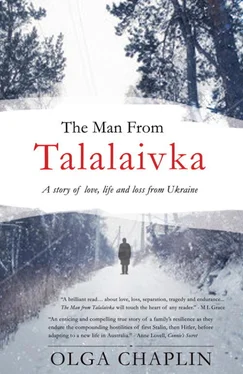The dull overhead lights were turned on. The conveyor belt started. She took a deep breath as she disciplined herself for another interminable day: hour after hour, day after day, of identical work, of some small parts that, however insignificant and innocuous they seemed on the conveyor belt, would find their mark in the future bombs on Allied cities in far away countries. She looked along the conveyor belt and noticed there were a few more vacant places, shivered at the consequences for these missing women. Then, at the farthest end, she caught sight of young Maria, from the Talalaivka journey. They nodded courteously to each other, their eyes still on the conveyor belt. The guards were watching, eyeing them. Her mind shut off from the friendship nod. The guards reported all activity to the camp commandant. Mechanically, she placed another ball bearing into a socket, the smell of grease and kerosene permeating around her, the fumes from a strange orange powder stored in a far corner stinging her eyes, her tears undetected in the gloomy light.
* * *
A thunderous blast shook the dormitory. Evdokia grabbed Mykola and Nadia, fumbled her way in the dark towards the locked door, waited, trembling, with the other panicked women for the soldiers.
“Dear God, may these doors open quickly,” she pleaded inwardly, afraid that they would all perish. She could hear the soldiers, the keys jangling at the locks, smelled the suffocating fumes of the burning factory as their dormitory door was thrown open.
“Hurry! Hurry! We must evacuate! Move now! Move! Move!” the soldiers shouted, their torches beaming haphazard paths for their inmates to follow. Newly recruited cadet soldiers, they feared for their own safety, if not for the prisoners. Clutching the children, Evdokia ran out towards the flickering path. Only then, as the icy droplets of dew shot pain through her did she realise they were all barefoot. She looked about, desperate to glimpse Peter’s dormitory, her heart pounding as she feared they would remain separated.
In the confusion of the darkness, with flames leaping up into the night sky and the crackling of factory chemicals around them, Evdokia ran towards one torch-lit path, then another; then froze. The soldiers’ shouting, their wavering signals, confused her. The past months of imprisonment and regimentation had made her cautious: too cautious. Now, she could not make sense of their conflicting panicked instructions: could not trust them, uncertain whether she and her children were being led to safety, or to their doom.
The din around her began to fade: she felt faint, about to black out. At that moment, a man’s shape stood before her, silhouetted by the reddened night. “Dyna,” Peter’s familiar voice whispered in the dark. His hand grasped her stiff shaking arm that would not let go of the children. “They’re moving us, Dyna… the factory is demolished… they may come back again in the night, the bombers. The commandant is moving us all out right now, before the next attack. Come, now… we are together again… God willing, we will live.”
He looked up into the black night. He could only guess at the Allies’ new ‘carpet-bombing’ strategy, whispered among the guards, which was made even more deadly with the improved American B29 bombers that now almost seemed to hover above the anti-aircraft fire, to Hitler and Goering’s chagrin. He shook his head. The new year of 1944 was almost upon them, the surrounding fir trees soon to be made Christmas-like with the anticipated snow. But these fireworks, from above and below, were lethal. There would be no joy, whichever side of the military divide laid claim to any victories in this harshest of winters.
Peter’s soothing voice, his firm grasp leading her, gave Evdokia hope. Still in a confused state, she followed him as he carried Nadia and comforted Mykola. They took their turn in the long line of prisoners as each truck filled to capacity, and rumbled off into the night to another temporary destination, westward yet again. In the chilly air, as the truck grappled its way along another pitted road, Evdokia grasped her shoulder in a moment of self-protection, felt the rough fabric of the ‘OST’ insignia she had months earlier sewn over the temporary ink-stamp. They were labelled wherever they were taken, within Hitler’s Germany; labelled with his other dictum, ‘Unmenschen’, that excused the feverish zeal with which his underlings Sauckel and Himmler utilised their forced labourers: labels that added a further sting to each proud Ukrainian.
Her heart still pounding and missing beats as if she might blank out again, she clung to Peter. Miraculously, their little family was united again. But her heart prepared her: at a whim, they could be separated yet again, as they were these past months. She could not be certain her body, her mind, would find the inner strength, the resolve, to go through this trauma again.
High up in the night sky, the loaded Allied bombers droned to their new targets, over-riding her inner moan of despair, her tears at last released as she leant towards her strong, hopeful husband for support.

Chapter 29
Perfunctorily saluting, the SS guard jerked his rifle at his prisoners to step forward. The camp commandant pushed his lunch tray to one side and nodded to the interpreter. Evdokia felt defeated. Her fear was increased by the nausea she felt in her state of pregnancy. She glanced at Maria. There was little use in collaborating a story. And the evidence the SS guards had when they captured them heading towards the tiny Federwader station was proof of their guilt in their attempted escape. She realised, too late, the folly of accepting her friend’s assurance that they would not be followed along the quiet wooded roadway.
“You were caught leaving the camp,” the commandant began, glancing from the files to the women, then back to the files again. “You were preparing to escape… You and your children were dressed for a journey, with your valises… You planned to go to Wilhelmshaven?” He looked sternly at Evdokia, then at her friend. He did not wait for their answer.
“You know the penalties for attempting to escape. They are severe… even for women with children.” Evdokia’s heart pounded within the cavity of her strained body, hunger gnawing at her. She looked at the generous scraps on the commandant’s tray and realised she had not eaten since early morning, having given little Mykola and Nadia her piece of black rye bread for the long walk to Federwader station. Her body, heavy with expectant child, ached for nourishment. She bit her dry lip, felt faint at the thought of punishment for the crime of her desperate attempt to reach Peter’s camp. She had no news of him for many weeks, could not be certain if he was still alive. Somehow, Mikhaelo’s letters continued to reach Maria. She surmised that the men, grouped by the SS as forced labourers, must still be fighting the air-raid fires of Wilhelmshaven, as much in order to stay alive at the behest of the SS rifles as being blackmailed to risk their lives in order that no harm would come to their wives and children in the Federwader camp.
She blinked, eyes swelling with tears, as the irony of Mikhaelo’s regular letters to his wife hit her. The German system of administration was remarkable, in the face of its adversity in this summer of 1944: its cities constantly bombed, its factories and railways disrupted, its people killed and maimed. Yet, somehow, the postal and communications systems continued to operate as if it were servicing a nation in peace-time conditions. For this, Hitler could thank his chief Reich architect, Albert Speer, who worked tirelessly to untangle the chaos wreaked daily through Allied bombings and underground espionage.
Читать дальше













